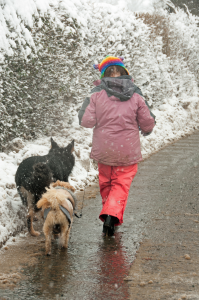For many places, this winter has been harsher than it has been in a long time, and it’s not over yet. Regardless of the weather, though, most dogs want to go outside. In fact, some actually revel in the snow, playing and rolling in it for hours. While it is fun to watch a dog romp in the drifts and try to catch snowflakes, walking when it’s icy and cold can be hazardous to both the dog and human. Follow these tips to ensure you have an enjoyable walk in your winter wonderland.
Proper Clothing
No, I am not talking about for yourself – though I would recommend traction shoes and gloves for yourself – but for your canine companion.
Waterproof Coat! If you have a city dog used to a temperature controlled dwelling, freezing temperatures can be quite a shock for your dog and could make them sick. Make sure your dog has a proper waterproof coat, especially short hair breeds.

Booties! Booties not only keep feet warm, but are practical for preventing cuts from sharp shards of ice and slipping. In addition, booties will keep snowballs from forming in your dog’s pad, which can also cause discomfort and abrasions. Ultra Paws and Black Ice Dog Sledding have some good choices.
Tips for the Walk
Shovel & Salt First! If you have deep snow, shovel a pathway first and then put salt down to melt as much ice as you can. If you are using a commercial ice melting product, make sure it’s safe for animals.
No Pulling! Remember both you and your dog are in danger of slipping and injury in ice and snow. If you have a dog that pulls a lot, you may want to forgo a walk and just let them potty off leash in the backyard. A pulling dog can easily pull you off your feet on ice. If your dog pulls and you must walk, try a front-clasping harness or a head halter, to help ease the strength of their pull. In addition, avoid sidewalks and icy patches, try to stay on the snow, where you can get at least some traction (this is where those traction shows I mentioned earlier are important!) and if you do fall, it’s a lot softer.
Walk slowly! Do not hurry! Give yourself plenty of time and stay at a walk. If you are at all nervous about falling, try to stay near something like a fence, so you can grab onto it if you fall. Avoid streets where you and your dog could get hit if you end up falling and not able to move from an injury.
Visibility! Wear bright clothing and make sure you and your dog can easily be seen from a distance. Remember, cars will take a lot longer to slow in the snow and ice, so you need to be visible from further away than usual. This is especially important for a white dog. In the event he gets away from you, you want to be able to see him in all that snow. A bright jacket with reflectors will make finding him a lot easier.
Carry a Phone! In case there is an emergency, make sure you have your phone with you, along with bandages for cuts and extra booties (in case one gets lost in the snow)
About the Author
Based in Tustin, Calif., animal lover Kristina N. Lotz is a Certified Professional Dog Trainer – Knowledge Assessed (CPDT-KA) and works as a full time trainer. She also owns her own custom pet products company, A Fairytail House, where she makes personalized collars, leashes, beds, keepsake pillows and blankets, and anything else your imagine can think up. In her spare time, she trains and competes in herding, agility, obedience, rally, and conformation with her Shetland Sheepdogs.
